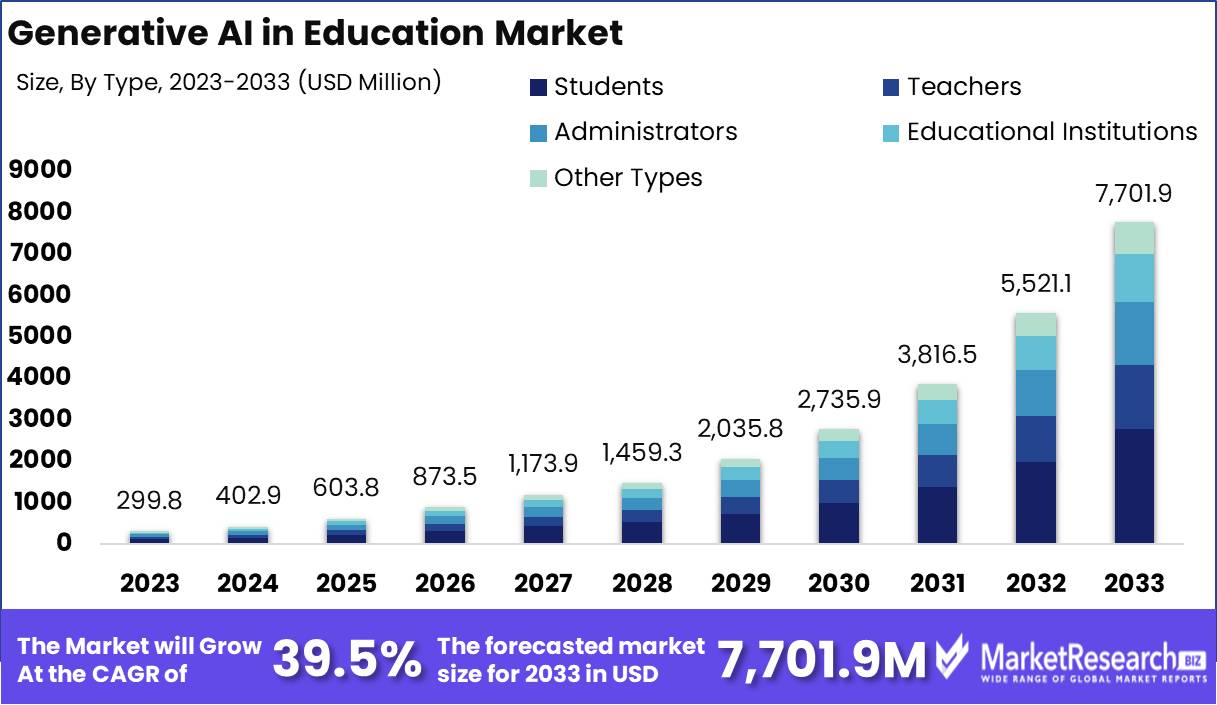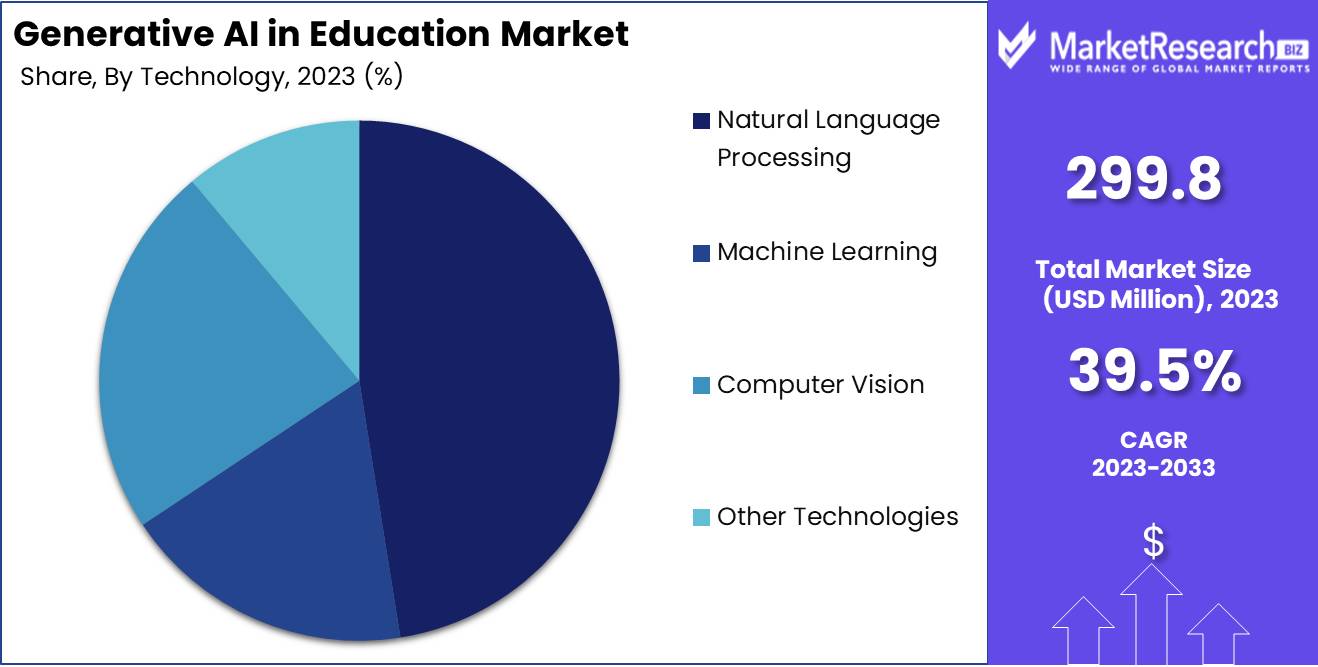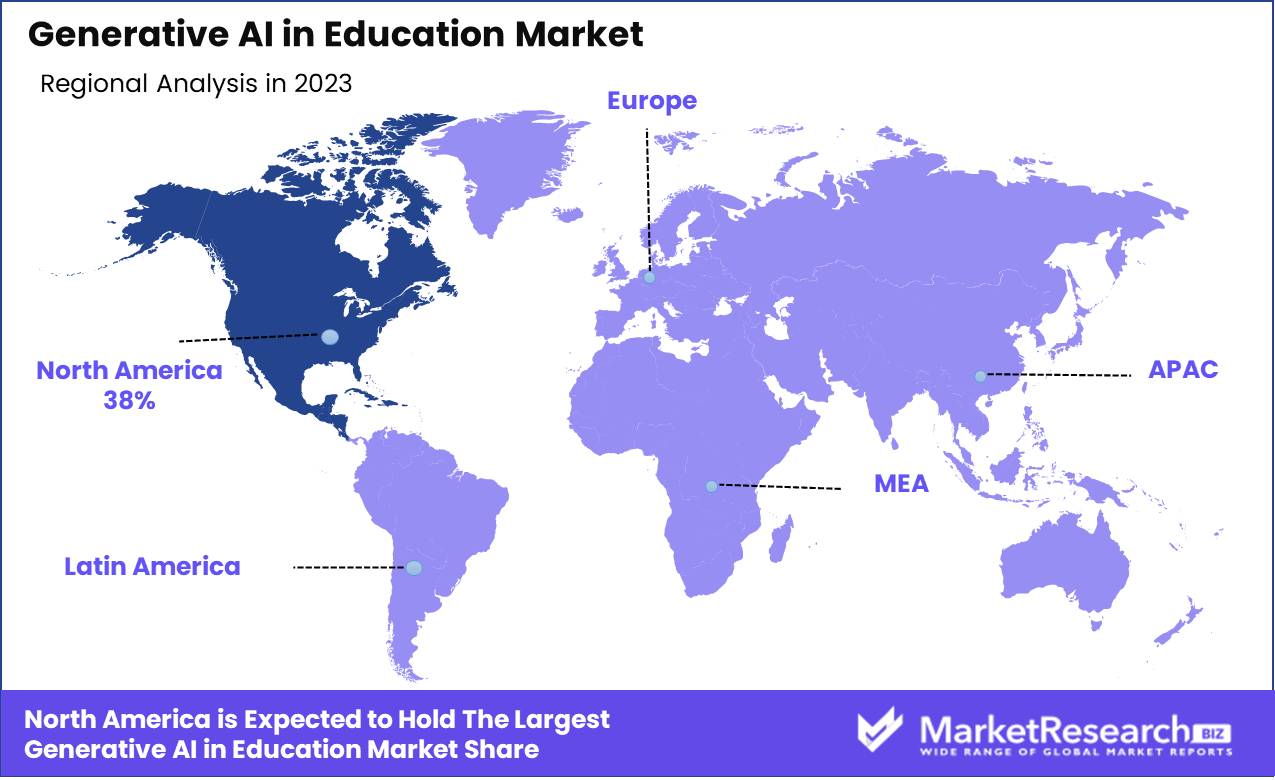
Global Generative AI in Education Market by Type (Students, Teachers and Other ), By Application (Adaptive Learning, Content Generationand Other ), By Deployment (On-Premise, Cloud-Based) By Region and Companies - Industry Segment Outlook, Market Assessment, Competition Scenario, Trends, and Forecast 2024-2033
-
36858
-
April 2024
-
300
-
-
This report was compiled by Vishwa Gaul Vishwa is an experienced market research and consulting professional with over 8 years of expertise in the ICT industry, contributing to over 700 reports across telecommunications, software, hardware, and digital solutions. Correspondence Team Lead- ICT Linkedin | Detailed Market research Methodology Our methodology involves a mix of primary research, including interviews with leading mental health experts, and secondary research from reputable medical journals and databases. View Detailed Methodology Page
-
Report Overview
Generative AI in Education Market size is expected to be worth around USD 7,701.9 Mn by 2033 from USD 299.8 Mn in 2023, growing at a CAGR of 39.5% during the forecast period from 2024 to 2033.
The surge in demand for education sectors and new advanced technologies are some of the main key driving factors for generative AI in the education market. GenAI such as ChatGPT can change various industrial sectors that also include the education sector. The latent applications of GenAI in the education sector are endless with customized study content being one of the many chances floating all across the market. Many educational experts believe that developing innovative and exciting products that require GenAI will permit educators to develop engaging and collaborative learning experiences to help foster the growth of the students.

According to UNESCO in May 2023, highlights that as per a survey conducted by UNESCO, more than 450 schools and educational universities found that less than 10% have developed institutional formal guidance and regulations that are concerned about using the GenAI application. Moreover, there was a first meeting of ministers of education that was held in May 2023, stating that many firms are developing a set of rules and regulation guidelines with the help of GenAI in education and research. This will also framework AI capabilities for the students and lecturers for school education. These will be introduced in Digital Learning Week which will be conducted in UNESCO HQs in Paris from 4 to 7 September 2023. The UNESCO global education monitoring report that was published in July 2023 highlights the use of advanced technology in education.
The adoption of GenAI in education has several advantages such as it helps in task automation that helps professors and lecturers to handle abundant organizational and administrative tasks. This technology also helps in customized learning and provides public access. GenAI helps in developing smart content that makes the teaching and learning process more easy and comfortable for the students. GenAI helps in the simulation and visualization of study environments for the students as well as for the teachers. GenAI provides numerous facts and knowledge to the teachers to help them upgrade and this will also help them in the teaching process. GenAI offers 24x7 virtual assistance that can provide solutions to the student’s queries. The demand for generative AI in education will rapidly grow due to its advanced technology and intensive use in the education sector which will help in market expansion during the forecasted period.
Key Takeaways
- Market Value: Generative AI in Education Market size is expected to be worth around USD 7,701.9 Mn by 2033 from USD 299.8 Mn in 2023, growing at a CAGR of 39.5% during the forecast period from 2024 to 2033.
- Based on Type: Students represent the dominant sub-segment in the generative AI education market.
- Based on Application: Adaptive learning leads as the dominant application in generative AI.
- Based on Technology: Natural Language Processing is the leading technology in generative AI.
- Based on Deployment Mode: On-premise deployment dominates the generative AI education market segment.
- Regional Analysis: North America holds 38% of the generative AI education market.
- Growth Opportunity: In 2023, Generative AI in the education market will offer significant growth opportunities through the automation of educational content creation and the expansion of virtual tutors and chatbots, which streamline curriculum development and enhance personalized learning support, respectively.
Driving factors
AI-Generated Tutoring: Democratizing Education Through Technology
AI-generated tutoring systems embody a significant advancement in educational technology, serving as virtual tutors that offer personalized learning experiences and real-time feedback. This approach is especially beneficial in regions where access to quality education and skilled teachers is limited. Generative AI enables the development of scalable, personalized educational tools that adapt to individual learning speeds and styles, potentially transforming the educational landscape. For instance, a 2021 study by the International Society for Technology in Education highlighted that AI tutors could improve learning outcomes by up to 40% in subjects like mathematics, demonstrating the substantial impact of personalized learning environments.
Virtual Reality Simulations: Enhancing Engagement and Understanding
Integrating generative AI with virtual reality (VR) technology stands out as a dynamic driver in the education sector, particularly in STEM fields. This combination creates immersive and interactive learning environments that simulate real-world scenarios, making complex subjects more tangible and understandable. These VR simulations can dramatically increase student engagement and motivation, leading to higher retention rates and deeper learning. For example, a VR chemistry lab allows students to conduct experiments in a safe, controlled virtual space, enhancing their practical understanding without the risks associated with physical experiments.
Accessibility: Tailoring Education to Diverse Needs
Generative AI significantly enhances accessibility in education, offering tailored learning experiences for students with disabilities. This technology can adjust content delivery to suit various learning disabilities and preferences, ensuring that education is inclusive and equitable. Customizable features, such as modified content presentation and interaction models, allow students with visual, auditory, or cognitive impairments to engage with educational material more effectively. This not only supports better educational outcomes for students with disabilities but also fosters a more inclusive educational environment overall. As education continues to evolve, generative AI stands as a pivotal technology in creating equal opportunities for all learners.
Restraining Factors
Reliability and Quality of Generative AI Models: Ensuring Trust in AI-driven Learning Tools
The reliability and quality of generative AI models are crucial factors that can either foster or hinder their adoption in the educational sector. When these models fail to deliver accurate and reliable content, it can undermine the educational process, leading to misinformation and a lack of trust among users. For instance, inaccuracies in AI-generated content could result in students learning incorrect information, which is particularly problematic in subjects requiring precise, factual knowledge such as the sciences or mathematics.
A survey by Educators Technology highlighted concerns among teachers regarding the accuracy of AI tools, with over 30% expressing doubts about the reliability of AI-generated content. Addressing these quality issues is essential to enhance the credibility and adoption of AI tools in education, necessitating ongoing research and development to refine AI algorithms and data sets.
Reluctance from Educators and Learners: Overcoming Adoption Barriers
Resistance from educators and learners to embrace AI-driven education represents a significant barrier to the integration of generative AI in the educational system. This reluctance often stems from a lack of familiarity with AI technology, concerns over job displacement, and fears that AI cannot replicate the nuanced interactions of human teaching. For example, a 2020 study by the Learning and Work Institute found that 47% of teachers were apprehensive about integrating AI into their teaching practices due to fears of dehumanizing the learning experience.
Overcoming these barriers requires comprehensive training programs for educators, showcasing the complementary role of AI in enhancing teaching effectiveness and student engagement without replacing the human touch that is vital in education. Promoting awareness and demonstrating the benefits of AI through pilot programs and case studies can also help in reducing resistance and encouraging a more receptive attitude towards generative AI tools in educational contexts.
By Type Analysis
Students represent the dominant sub-segment in the generative AI education market, driving innovation and adoption.
In 2023, students held a dominant market position in the user-based segment of the Generative AI in the Education Market. This prominence underscores the pivotal role that Generative AI technologies play in enhancing personalized learning experiences, adaptive learning paths, and interactive learning environments. The integration of Generative AI tools has been particularly transformative in customizing study materials and learning activities according to individual learning paces and preferences, thus significantly elevating student engagement and educational outcomes.
Generative AI applications for students primarily focus on creating dynamic content such as customized quizzes, interactive textbooks, and real-time feedback mechanisms. These tools not only foster a deeper understanding of subjects but also cater to diverse learning modalities, thereby accommodating different learning styles and needs. The technology's ability to analyze vast amounts of data allows for the optimization of learning processes, identifying knowledge gaps, and recommending personalized learning strategies.
By Application Analysis
Adaptive learning emerges as the leading application in the generative AI education market landscape.
In 2023, Adaptive Learning held a dominant market position in the application-based segment of Generative AI in Education Market. This dominance is largely attributed to the increasing recognition of personalized education's efficacy in improving learning outcomes. Adaptive learning systems powered by Generative AI dynamically adjust educational content and teaching strategies based on real-time student data, thereby optimizing the learning experience to suit individual student needs and pace.
The effectiveness of adaptive learning platforms is rooted in their ability to seamlessly integrate with existing educational curricula and provide scalable, customized learning experiences. These systems utilize advanced algorithms to analyze student interactions and performance, enabling them to deliver tailored resources and assessments that address specific strengths and weaknesses. Consequently, students receive a highly personalized learning journey, leading to increased engagement and improved academic performance.
By Technology Analysis
Natural Language Processing is the leading technology sub-segment in the generative AI education market.
In 2023, Natural Language Processing (NLP) held a dominant market position in the technology-based segment of Generative AI in Education Market. This leading status is a reflection of NLP's critical role in facilitating more natural, intuitive interactions between students and digital learning platforms. NLP technologies enable the processing and understanding of human language in a way that allows for effective communication, making them essential for the development of intelligent tutoring systems, chatbots, and other interactive educational tools.
The appeal of NLP in educational settings is largely due to its ability to decode and respond to student inputs, which can range from answering queries to providing feedback and explanations. This capability not only enhances the learning experience but also supports a more personalized approach by adapting responses based on the learner's language style and proficiency. Additionally, NLP is instrumental in content generation, enabling the creation of study materials and assessments that are tailored to the learner's current understanding and needs.

By Deployment Mode Analysis
On-premise deployment dominates the generative AI education market, offering enhanced data security and control.
In 2023, On-Premise deployment held a dominant market position in the deployment mode segment of Generative AI in the Education Market. This prominence can be attributed to the enhanced security and control that on-premise solutions offer educational institutions. Particularly for organizations handling sensitive data or operating in jurisdictions with stringent data protection regulations, on-premise systems provide a level of data sovereignty and security that cloud-based alternatives cannot match.
The preference for on-premise solutions in some educational sectors stems from the need for customized integration with existing IT infrastructures without relying on external networks. This arrangement minimizes potential vulnerabilities associated with data breaches and unauthorized access, a critical consideration for institutions prioritizing student data privacy.
Key Market Segments
Based on Type
- Students
- Teachers
- Administrators
- Educational Institutions
- Other Types
Based on Application
- Adaptive Learning
- Content Generation
- Automated Grading
- Personalized Tutoring
- Virtual Simulations
- Intelligent Learning System
- Other Applications
Based on Technology
- Natural Language Processing
- Machine Learning
- Computer Vision
- Other Technologies
Based on Deployment Mode
- On-Premise
- Cloud-Based
Growth Opportunity
Automated Content Creation: Streamlining Educational Material Production
One of the most significant opportunities in 2023 for the global Generative AI in the education market lies in automated content creation. Generative AI's ability to automate the development of tailored educational materials—such as exercises, quizzes, and simulations—presents a substantial growth avenue. This technology not only enhances the efficiency of content production but also ensures that materials are closely aligned with specific learning objectives and curricular standards. For educators, this translates into significant time savings, allowing them to focus more on pedagogy and less on content generation. The automation of routine and repetitive tasks in content creation can revolutionize curriculum development, making it more adaptable and responsive to student needs and learning outcomes.
Virtual Tutors and Chatbots: Enhancing Personalized Learning Support
Another key opportunity is the expansion of virtual tutors and chatbots in educational settings. These AI-driven tools provide students with real-time support and guidance, thereby enhancing learner engagement and understanding. E-learning Virtual tutors and chatbots can address student queries instantly, offer personalized feedback, and guide learners through complex concepts at any time of the day, significantly extending the reach and impact of educators. For instance, a chatbot could instantly clarify a student’s doubt during a homework session, a level of personalized interaction that is difficult to achieve in traditional educational environments. This capability not only improves student satisfaction and learning outcomes but also empowers teachers to deliver more engaging and effective educational sessions.
Latest Trends
Automated Graded Assessments: Revolutionizing Evaluation Processes
A pivotal trend in 2023 for the global Generative AI in the education market is the rise of automated graded assessments. AI-driven feedback systems are set to revolutionize the way exams and assessments are conducted by providing speed, reliability, and flexibility. These systems can instantly evaluate responses, offering immediate feedback to students, which is essential for effective learning. Additionally, the accuracy and objectivity of AI in assessing student work can alleviate the heavy grading load on educators, allowing them more time to focus on teaching and less on administrative tasks. The flexibility of AI systems to adapt to various testing formats and complexity levels also enhances assessment capabilities across diverse educational settings, from K-12 to higher education.
AI-Powered Personalized Education: Customizing Learning Experiences
Another significant trend is the development of AI-powered personalized education platforms. These platforms utilize generative AI to adapt to individual learning needs, styles, and paces, offering a truly customized learning experience. This trend marks a shift from one-size-fits-all teaching approaches to more tailored educational strategies that can significantly improve learning outcomes. Personalized learning algorithms analyze student performance and preferences to deliver content that challenges and engages each learner at their level. This not only increases student engagement and motivation but also promotes deeper understanding and retention of material.
Regional Analysis
North America Accounted for the Largest Revenue Share in Generative AI in Education Market in 2023.
The Generative AI in Education market is witnessing a transformative phase across various global regions, each displaying unique characteristics and growth dynamics. North America, holding a dominant market share of 38%, is the front-runner, propelled by substantial investments in AI technology and a robust educational infrastructure that encourages early adoption of AI tools. The region benefits from a concentration of leading AI research institutions and tech giants, which facilitates the swift integration of generative AI into educational platforms and curricula.

Europe follows, characterized by strong regulatory frameworks and increasing investment in digital infrastructure. European educational institutions are rapidly adopting AI to personalize learning and enhance research methodologies. The European Commission’s Digital Education Action Plan further supports this integration, aiming to foster digital skills and learning methods through AI.
The Asia Pacific region is the fastest-growing segment, driven by a burgeoning youth population and escalating digital penetration. Countries like China, Japan, and South Korea are investing heavily in AI to overhaul their educational systems. This region’s growth is supported by government initiatives that promote AI in education to improve both the quality and accessibility of learning.
In the Middle East & Africa, the adoption of AI in education is in the nascent stages but growing, driven by the digitization of education and government initiatives aimed at diversifying the economy through technology. The region shows promise with gradual enhancements in ICT infrastructure and partnerships with global tech leaders.
Latin America, although currently a smaller player, is experiencing increased interest in AI education tools, particularly in response to the need for remote learning solutions triggered by the pandemic. Countries like Brazil are leading the way, with both public and private sectors pushing for educational technology to bridge learning gaps.
Key Regions and Countries
North America
- The US
- Canada
- Mexico
Western Europe
- Germany
- France
- The UK
- Spain
- Italy
- Portugal
- Ireland
- Austria
- Switzerland
- Benelux
- Nordic
- Rest of Western Europe
Eastern Europe
- Russia
- Poland
- The Czech Republic
- Greece
- Rest of Eastern Europe
APAC
- China
- Japan
- South Korea
- India
- Australia & New Zealand
- Indonesia
- Malaysia
- Philippines
- Singapore
- Thailand
- Vietnam
- Rest of APAC
Latin America
- Brazil
- Colombia
- Chile
- Argentina
- Costa Rica
- Rest of Latin America
Middle East & Africa
- Algeria
- Egypt
- Israel
- Kuwait
- Nigeria
- Saudi Arabia
- South Africa
- Turkey
- United Arab Emirates
- Rest of MEA
Key Players Analysis
The global Generative AI in Education market continues to evolve with several key players driving innovation and market expansion. IBM Corporation, Microsoft Corporation, and Google LLC are at the forefront, leveraging their extensive technological prowess and established market presence. These industry giants not only invest heavily in research and development but also foster significant partnerships with educational institutions to integrate AI seamlessly into diverse learning environments. Their solutions primarily focus on enhancing personalized learning, automating administrative tasks, and facilitating immersive educational experiences through advanced analytics and machine learning models.
Cognii Inc., a specialist in AI-driven educational technology, focuses on providing personalized tutoring and assessment solutions. Their technology is particularly noted for its ability to adapt to individual student needs, thereby enhancing student engagement and learning outcomes. Similarly, Knewton provides adaptive learning technologies that customize educational content, making learning more responsive to individual pace and performance.
Blackboard, traditionally strong in educational software, is increasingly integrating AI to expand its analytics and learner engagement tools. This shift aims to enhance user experience and improve educational outcomes through more tailored content and predictive analytics.
Metacog Inc. and Duolingo represent niche innovations within the sector. Metacog specializes in developing AI solutions that improve the development and assessment of higher-order thinking skills, while Duolingo uses AI to make language learning more effective and engaging, demonstrating substantial user growth.
Market Key Players
- IBM Corporation
- Microsoft Corporation
- Google LLC
- Cognii Inc.
- Knewton
- Blackboard
- Metacog Inc.
- Duolingo
- Other Market Players
Recent Development
- In April 2024, According to a survey conducted by the AI Education Project (aiEDU), K-12 educators exhibited a mix of concern and curiosity about the integration of generative AI in education, highlighting a need for professional development and curriculum inclusion despite limited experience and apprehension about its potential impacts.
- In February 2024, According to a comprehensive assessment by Forbes, the integration of artificial intelligence in education is poised to enhance learning experiences and increase accessibility, while also necessitating robust policies to manage risks and preserve the essential human elements of teaching.
- In February 2024, According to Stanford education experts like Dan Schwartz, new technological advancements such as AI and virtual reality are transforming teaching methods and the educational landscape, as discussed in a Stanford Graduate School of Education report.
- In March 2024, Accenture launched LearnVantage, an AI-powered tech education platform supported by a $1 billion investment over three years, aiming to reskill and upskill employees in technology, data, and AI through its acquisition of EdTech company Udacity, according to PYMNTS.
Report Scope
Report Features Description Market Value (2023) USD 299.8 Mn Forecast Revenue (2033) USD 7,701.9 Mn CAGR (2024-2033) 39.5% Base Year for Estimation 2023 Historic Period 2016-2023 Forecast Period 2024-2033 Report Coverage Revenue Forecast, Market Dynamics, COVID-19 Impact, Competitive Landscape, Recent Developments Segments Covered By Type (Students, Teachers, Administrators, Educational Institutions, Other Types), By Application (Adaptive Learning, Content Generation, Automated Grading, Personalized Tutoring, Virtual Simulations, Intelligent Learning System, and Other Applications), By Technology (Natural Language Processing, Machine Learning, Computer Vision and Other Technologies), By Deployment Mode (On-Premise, Cloud-Based) Regional Analysis North America – The US, Canada, & Mexico; Western Europe – Germany, France, The UK, Spain, Italy, Portugal, Ireland, Austria, Switzerland, Benelux, Nordic, & Rest of Western Europe; Eastern Europe – Russia, Poland, The Czech Republic, Greece, & Rest of Eastern Europe; APAC – China, Japan, South Korea, India, Australia & New Zealand, Indonesia, Malaysia, Philippines, Singapore, Thailand, Vietnam, & Rest of APAC; Latin America – Brazil, Colombia, Chile, Argentina, Costa Rica, & Rest of Latin America; Middle East & Africa – Algeria, Egypt, Israel, Kuwait, Nigeria, Saudi Arabia, South Africa, Turkey, United Arab Emirates, & Rest of MEA Competitive Landscape IBM Corporation, Microsoft Corporation, Google LLC, Cognii Inc., Knewton, Blackboard, Metacog Inc., Duolingo, and Other Market Players Customization Scope Customization for segments, region/country-level will be provided. Moreover, additional customization can be done based on the requirements. Purchase Options We have three licenses to opt for: Single User License, Multi-User License (Up to 5 Users), Corporate Use License (Unlimited User and Printable PDF) -
-
- IBM Corporation
- Microsoft Corporation
- Google LLC
- Cognii Inc.
- Knewton
- Blackboard
- Metacog Inc.
- Duolingo
- Other Market Players




